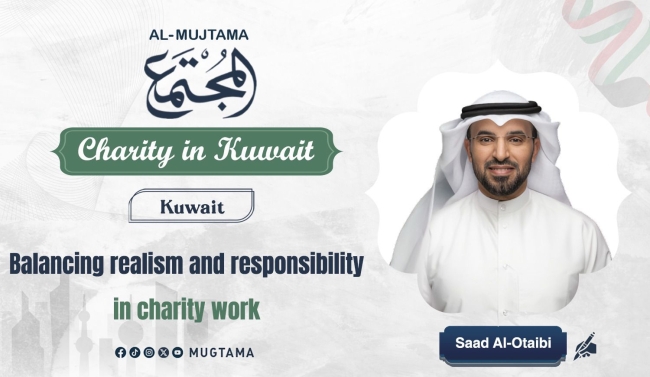Balancing realism and responsibility in charity work Featured
Balancing realism and responsibility in charity work
Charity work, through its institutions and individuals, represents a fundamental pillar in building communities and supporting those in need. However, these institutions are not immune to making mistakes, as they are part of human endeavors that are inherently flawed. Just as commercial or governmental institutions may face challenges and failures, charity work can also experience errors, whether in management, implementation, or even in the selection of individuals.
One of the common mistakes in dealing with charitable institutions is to view them with absolute sanctity as if they cannot err or be mismanaged. This idealistic perspective can lead to societal shock when any mistake occurs, no matter how small. Therefore, it is important to understand that charity work, like other fields, relies on human efforts that can both succeed and fail.
The Incident of the Zakat Worker: A Model of Realism and Sound Leadership
The incident of the zakat worker during the Prophet Muhammad's (peace be upon him) time provides a clear example of this realism. The Prophet's (peace be upon him) choice of a worker to collect alms was a human judgment, but it was later proven that he was not competent for the task. Nevertheless, this mistake did not lead to a loss of trust in the zakat system or its message; rather, it was addressed with wisdom and transparency, enhancing its reputation and credibility.
Leadership Lessons from the Zakat Worker Incident
The incident of the zakat worker holds many leadership lessons that can be applied in managing charity work today:
1- Realism in Human Expectations: A successful leader recognizes that humans are prone to mistakes, even when chosen based on precise criteria. Therefore, it is essential to adopt continuous monitoring and evaluation mechanisms to ensure performance.
2- Transparency in Addressing Mistakes: The Prophet (peace be upon him) did not hesitate to confront the situation publicly, clarifying the mistake and reminding of its consequences. This underscores the importance of transparency when any malfunction occurs to maintain public trust in institutions.
3- Separation Between Individuals and the System: When the zakat worker made a mistake, it did not tarnish the image or message of the zakat system. This is an important lesson in distinguishing between individual errors and the goals of the institution and working to rectify the former without harming the latter.
4- Accountability and Justice: The Prophet (peace be upon him) applied the principle of accountability clearly, affirming that responsibility entails bearing the consequences of mistakes. This calls for establishing clear governance systems that hold workers accountable based on fair criteria.
5- Investing in Crises for Learning and Development: The Prophet (peace be upon him) did not merely resolve the issue; he exploited it as an opportunity to educate the nation on the principle of integrity in public work. Leading institutions can turn crises into lessons that enrich institutional work and prevent the recurrence of mistakes.
6- Developing Selection Mechanisms: The selection of staff was based on human effort, highlighting the importance of developing employee selection mechanisms according to clear criteria that include competence and integrity, while continuously training them on institutional values.
7- Establishing Integrity as a Core Value: The Prophet Muhammad (peace be upon him) emphasized that any public responsibility must be managed with the utmost honesty. This underscores the importance of integrity as a fundamental pillar in charitable work, ensuring the continuity of trust.
8- Balancing Criticism and Maintaining the System: The Prophet Muhammad (peace be upon him) addressed mistakes without allowing them to undermine the system of zakat. This illustrates the importance of constructive criticism aimed at reforming without threatening the continuity of work or losing community trust.
Avoiding Generalizations and Accusations
When a mistake occurs in a charitable organization, we must handle the event rationally without generalizations or sweeping accusations. Generalizing mistakes or accusing all workers in the sector harms the reputation of charitable work as a whole and discourages the efforts of dedicated individuals who work tirelessly to serve those in need. Criticism is necessary, but it should be constructive and specific, accompanied by solutions that help in reform rather than demolition.
Preserving and Purifying Charitable Work
Despite the mistakes that may occur, preserving charitable work is a community duty, as it represents an important channel for providing humanitarian assistance and alleviating the suffering of vulnerable groups. Therefore, efforts should focus on purifying charitable work from incorrect practices through:
- Enhancing transparency and accountability systems.
- Developing criteria for selecting employees and continuously evaluating their performance.
- Investing in training employees on integrity and work ethics.
Not immune from mistakes
Charitable work is not immune from mistakes, but at the same time, it is not a field for general accusations or excessive doubt. Realism requires us to acknowledge human shortcomings and work on correcting them without losing faith in the message of goodwill. Societies that skillfully manage criticism and promote an atmosphere of reform are the ones that can maintain these institutions as effective tools for spreading mercy and social justice.
The incident of the zakat worker is not just a historical event but a practical model for sound management, where the mistake was addressed transparently and justly while maintaining the community's trust in the system. If charitable organizations apply these lessons, they will become more efficient and capable of achieving their humanitarian mission, thereby enhancing their position as sources of benefit and benevolence in society.


